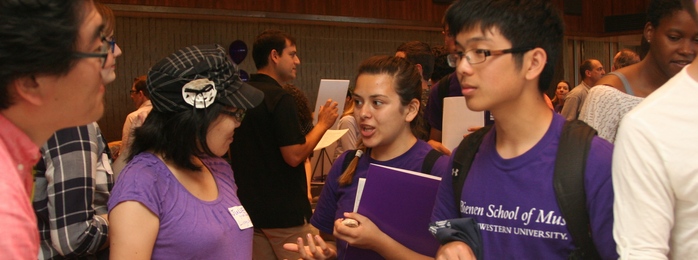First-Year Focus

What is Linguistics?
"The marvelous thing is that even in studying Linguistics, we find that the universe as a whole is patterned, ordered, and to some degree intelligible to us." - Kenneth L. Pike
Linguistics is the scientific study of language that examines its structures, how it is used to convey meaning, how it is acquired and processed in the mind and brain, its social functions, and how it evolves over timespans of individuals and societies. Linguists look for patterns in the articulation, perception, and sequencing of speech sounds, in the structure of words and sentences, and in the association of these patterns with different types of meaning, using empirical and computational methods to investigate languages in all their varieties, from all parts of the world.
Why Study Linguistics?
Language is a complex, species-specific system made up of several components (sounds, words, sentences, and meaning). The study of linguistics gives us a unique window on the structure of the human mind and the mind's activity. Linguistics contributes to advances in many real world applications, including the development of technologies for speech and natural language processing, second language learning, and diagnostics and interventions for individuals with atypical language function. Additional information can be found at the Linguistic Society of America.
Expand all
WHAT TO DO WITH A MAJOR IN LINGUISTICS?
Linguistics majors pursue careers in many different fields such as:
- Information Technology
- Consulting
- Marketing & Advertising
- Law
- Publishing
- Communications & Public Relations
- Healthcare & Speech-Language Pathology
- Foreign Service
- Language Teaching
- Government
- Journalism
- Translation and Interpreting
- Medicine
- Educational Testing
- Technical Writing
Some students use the BA in Linguistics to prepare for professional schools, or clinical programs in:
- Business
- Communication Sciences and Disorders
- Law
- Library/Information Science
- Medicine
- Speech Pathology
Other students continue their study of Linguistics in MA and Ph.D. programs, either in Linguistics or related fields like:
- Anthropology
- Artificial Intelligence
- Bilingual Education
- Cognitive Science
- Computer Science
- Music
- Philosophy
- Psychology
LEARNING GOALS OF THE DEPARTMENT OF LINGUISTICS
Linguistics students will develop critical, scientific thinking skills through learning across the subfields in linguistic science. Through
course work, students will gain a solid understanding of scientific approaches to the study of language, using the scientific method of hypothesis testing, theoretically guided empirical exploration, and the application of scientific argumentation in the construction of linguistic theories. Students will gain understanding of the complexity of language in its formal, cognitive, social, and physical aspects, and be able to relate language data to theories of linguistic structure and processing. Students will acquire skills in experimental methods, computational methods, and statistical modeling for the analysis of language data. Courses in the program introduce students to major themes in linguistics related to sound (Phonetics, Phonology), word and sentence structure (Morphology, Syntax), meaning (Semantics, Pragmatics), social uses of language (Sociolinguistics), and language technologies (Computational Linguistics). In each area, students will gain skills in communicating their understanding of language data and linguistic theories, in written and oral form. Students will also have opportunities to be actively involved in research, putting into practice the knowledge and skills gained in linguistics courses in research projects of their design, or in projects led by faculty members.
COURSES OPEN TO FIRST-YEAR STUDENTS
First-Year Seminars
Our department offers Weinberg College Seminars & First-Year Writing Seminars that cover various topics in linguistics.
Introductory courses
The Linguistics Department offers a selection of courses at the 200-level that introduce students to the fundamental properties of language and their scientific investigation. These courses can be used to fulfill a wide variety of Foundational Discipline or Distribution Requirements.
- LING 220 Language in Society
- LING 221 Language and Prejudice
- LING 222 Language, Politics, & Identity
- LING 223 Language and Gender
- LING 250 Sound Patterns in Human Language
- LING 260 Formal Analysis of Words and Sentence
- LING 270 Meaning
UNDERGRADUATE STUDIES IN LINGUISTICS
Please see the Northwestern online catalog for a complete listing of the current undergraduate courses in Linguistics, along with course descriptions and information about prerequisites.
ADVISING
Dr. Erin Leddon is the Director of Undergraduate Studies (DUS) for the Department of Linguistics and she is available to talk with students who are majoring or minoring in linguistics, as well as those just thinking about it. Students can meet with Dr. Leddon to discuss anything related to the study of Linguistics or the Linguistics major and minor, including the following topics:
- requirements for the linguistics major and/or minor
- course selections
- career choice
- planning your undergraduate career in linguistics
- research in the department
- graduate school options
Click here to make an appointment with the Dr. Leddon. Or feel free to stop by the main office of the Linguistics Department at 2016 Sheridan Road.

